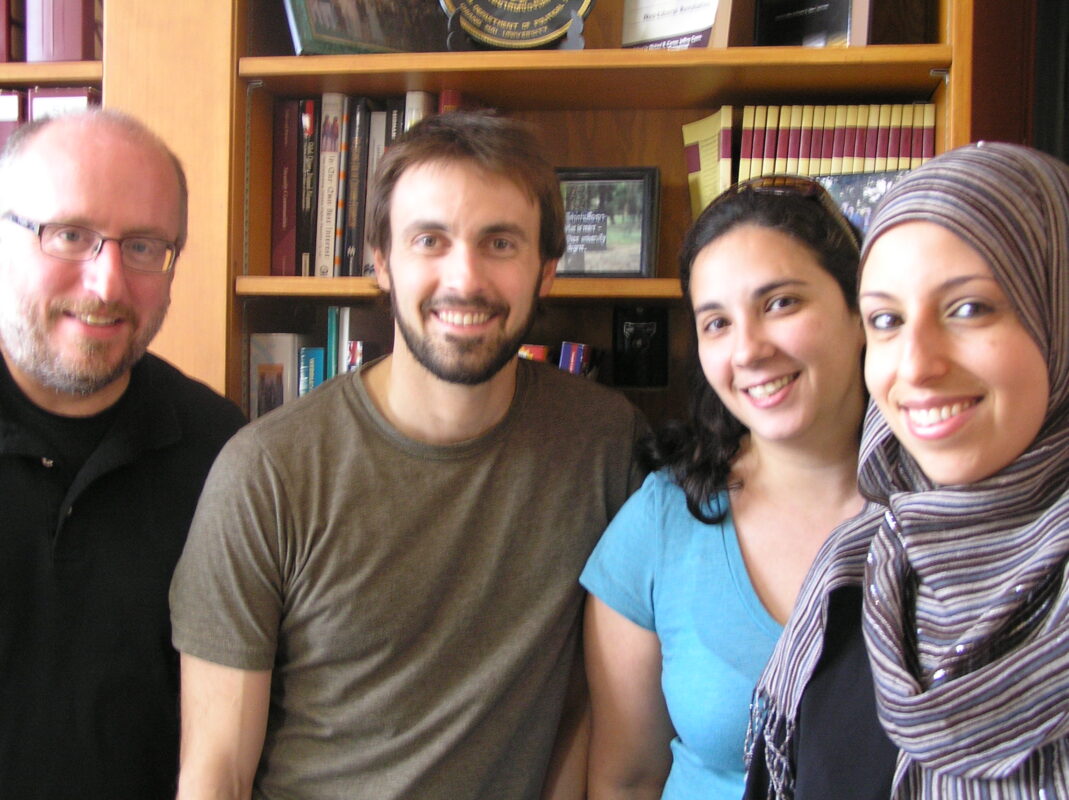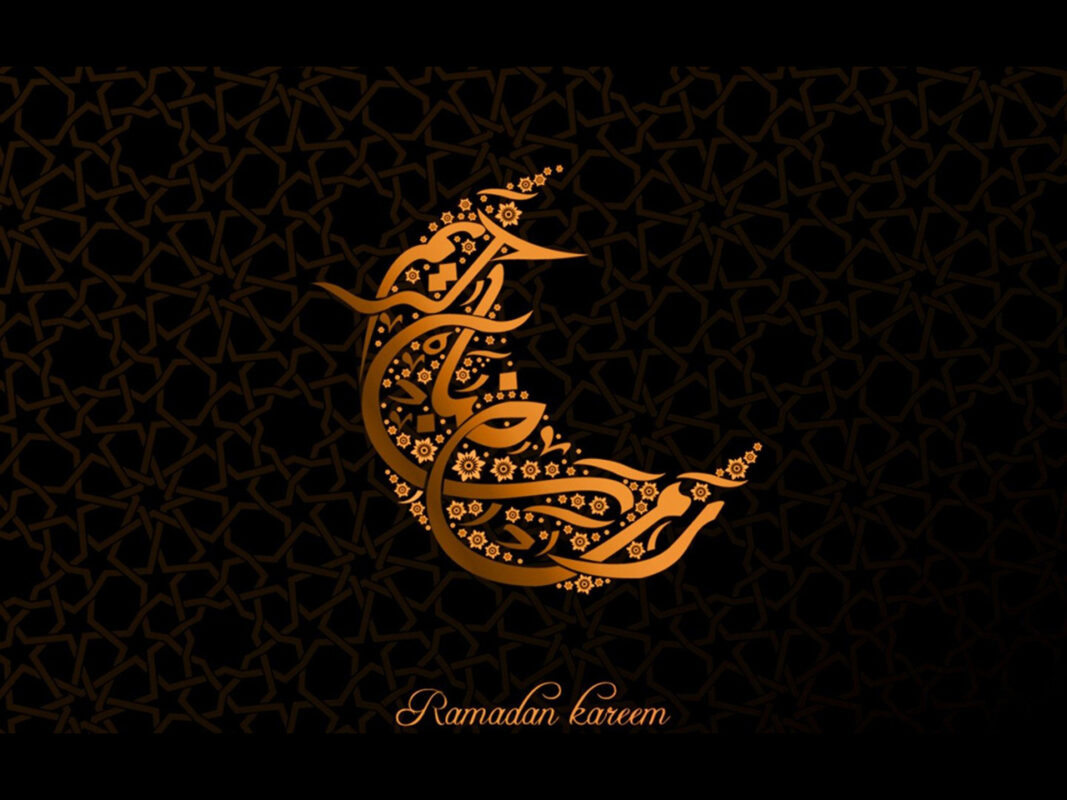In the Bible we can find the following four passages wherein Jesus (pbuh) predicts a great event:
John 14:16 “And I will pray the Father, and he shall give you another Comforter, that he may abide with you for ever”
John 15:26 “But when the Comforter is come, whom I will send unto you from the Father, [even] the Spirit of truth, which proceedeth from the Father, he shall testify of me”
John 14:26 “But the Comforter, [which is] the Holy Ghost, whom the Father will send in my name, he shall teach you all things, and bring all things to your remembrance, whatsoever I have said unto you.”
In these four verses, the word “comforter” is translated from the word “Paraclete” (“Ho Parakletos” in Greek). Parakletos in Greek is interpreted as “an advocate”, one who pleads the cause of another, one who councils or advises another from deep concern for the other’s welfare (Beacon Bible commentary volume VII, p.168). In these verses we are told that once Jesus (pbuh) departs, a Paraclete will come. He will glorify Jesus (pbuh), and he will guide mankind into all truth. This “Paraclete” is identified in John 14:26 as the Holy Ghost.
It must be pointed out that the original Greek manuscripts speak of a “Holy pneuma.” The word pneuma {pnyoo’-mah} is the Greek root word for “spirit.” There is no separate word for “Ghost” in the Greek manuscripts, of which there are claimed to be over 24,000 today. The translators of the King James Version of the Bible translate this word as “Ghost” to convey their own personal understanding of the text. However, a more accurate translation is “Holy Spirit.”
All Bibles in existence today are compiled from “ancient manuscripts,” the most ancient of which being those of the fourth century C.E. Any scholar of the Bible will tell us that no two ancient manuscripts are exactly identical. All Bibles in our possession today are the result of extensive cutting and pasting from these various manuscripts with no single one being the definitive reference.
What the translators of the Bible have done when presented with such discrepancies is to do their best to choose the correct version. In other words, since they can not know which “ancient manuscript” is the correct one, they must do a little detective work on the text in order to decide which “version” of a given verse to accept. John 14:26 is just such an example of such selection techniques.
John 14:26 is the only verse of the Bible which associates the Parakletos with the Holy Spirit. But if we were to go back to the “ancient manuscripts” themselves, we would find that they are not all in agreement that the “Parakletos” is the Holy Spirit. For instance, in the famous the Codex Syriacus, written around the fifth century C.E., and discovered in 1812 on Mount Sinai by Mrs.Agnes S. Lewis (and Mrs. Bensley), the text of 14:26 reads; “Paraclete, the Spirit”; and not “Paraclete, the Holy Spirit.”.
Is this just knit picking? “Spirit” or “Holy Spirit,” what’s the big deal? Obviously they both refer to the same thing. Right? Wrong! There is a big difference. A “spirit,” according to the language of the Bible simply means “a prophet” See for instance:
“Beloved, believe not every spirit, but try the spirits whether they are of God: because many false prophets are gone out into the world,”
1 John 4:1-3:
(also see 1 John 4:6), or an inspired human, for example read 1 Corinthians 2:10, 2 Thessalonians 2:2, …etc.
We have already exhibited in chapters one and two many documented cases of deliberate modification of the Biblical text by members of the Christian clergy themselves, as well as deliberate large scale projects to “correct” the Bible, and the writings of “the early fathers,” (such as the deliberate insertion of the verse of 1 John 5:7 which is now universally discarded). It is, therefore, possible that either:
1) The word “Holy” could have been dropped by a careless copyist., or
2) Someone could have inserted the word “Holy” to convey his personal understanding of the text.
Which was it? In order to arrive at the answer we must follow the same path of detective work the Biblical scholars themselves do. We must study the characteristics of the “Paraclete” and compare them to both the “Holy Spirit” and to a “Spirit.” Muslims believe that Muhammad (pbuh) was the one intended and not the Holy Ghost. In the Christian’s own “Gospel of Barnabas” Muhammad is mentioned by name here.
1) Christian scholars see evidence of tampering:
In the famous “Anchor Bible” we find the following quote:
“The word parakletos is peculiar in the NT to the Johnannine literature. In John ii Jesus is a parakletos (not a title), serving as a heavenly intercessor with the Father … Christian tradition has identified this figure (Paraclete) as the Holy Spirit, but scholars like Spitta, Delafosse, Windisch, Sasse, Bultmann, and Betz have doubted whether this identification is true to the original picture and have suggested that the Paraclete was once an independent salvific figure, later confused with the Holy Spirit.”
The Anchor Bible, Doubleday & Company, Inc, Garden City, N.Y. 1970, Volume 29A, p. 1135
We are about to see some of the evidence that goes to prove this position.
2) Does the Holy Spirit “speak” or “inspire”:
Muhammad (pbuh), as seen above, did indeed fulfill this prophesy. Whatsoever he “HEARD” from Gabriel (The Qur’an), the same did he physically “SPEAK” to his followers. In the Qur’an we read:
“(God swears) By the star when it falls!: Your comrade (Muhammad) errs not, nor is he deceived; Nor does he speak of (his own) desire. It is naught save a revelation that is revealed (unto him).”
The noble Qur’an, Al-Najm(53):1-4
3) The Holy Ghost was already with them:
In the above verses we read “if I go not away, the Comforter will not come unto you; but if I depart, I will send him unto you.” The comforter can not be the Holy Ghost because the Holy Ghost (according to the Bible) was “with” them already (and even quite active) long before the coming of Jesus (pbuh) himself and then throughout his ministry. Read for example.
Genesis 1:2 “And the earth was without form, and void; and darkness [was] upon the face of the deep. And the Spirit of God moved upon the face of the waters.”
1 Samuel 10:10 “And when they came thither to the hill, behold, a company of prophets met him; and the Spirit of God came upon him, and he prophesied among them.”
“And the Spirit of God came upon Saul when he heard those tidings, and his anger was kindled greatly.”
1 Samuel 11:6
“Then he remembered the days of old, moses, and his people, saying, Where is he that brought them up out of the sea with the shepherd of his flock? where is he that put his holy Spirit within him?”
Isaiah 63:11
“For he (John the Baptist) shall be great in the sight of the Lord, and shall drink neither wine nor strong drink; and he shall be filled with the Holy Ghost, even from his mother’s womb.”
Luke 1:15
“And the angel answered and said unto her, The Holy Ghost shall come upon thee.”
Luke 1:35
“And it came to pass, that, when Elisabeth heard the salutation of Mary, the babe leaped in her womb; and Elisabeth was filled with the Holy Ghost”
Luke 1:41
“And his father Zacharias was filled with the Holy Ghost, and prophesied, saying,”
Luke 1:67
“And, behold, there was a man in Jerusalem, whose name was Simeon; and the same man was just and devout, waiting for the consolation of Israel: and the Holy Ghost was upon him.”
Luke 2:25
“And it was revealed unto him by the Holy Ghost (Simeon), that he should not see death, before he had seen the Lord’s Christ.”
Luke 2:26
“And the Holy Ghost descended in a bodily shape like a dove upon him (Jesus), and a voice came from heaven, which said, Thou art my beloved Son; in thee I am well pleased.”
Luke 3:22
“Then said Jesus to them again, Peace be unto you: as my Father hath sent me, even so send I you. And when he had said this, he breathed on them, and saith unto them, Receive ye the Holy Ghost.”
John 20:21-22
Did they or did they not already receive the Holy Ghost? Was Jesus (pbuh) not still with them when they received the Holy Ghost? Was the Holy Ghost not with Simeon, Mary, Elisabeth and Zacharias before the birth of Jesus (pbuh)? Was the Holy Ghost not with Moses (pbuh) when he parted the seas? There are many more similar verses to be found in the Bible. In the above verses, we are told that if Jesus (pbuh) does not depart then the “parakletos” will not come. Thus, the “Holy Ghost” cannot be the one originally intended since it was already with them. The contradiction is quite obvious.
4) Selective translation: Jesus (pbuh) too is a Paraclete:
The word “Paraclete” is applied to Jesus (pbuh) himself in 1 John 2:1
“My little children, these things write I unto you, that ye sin not. And if any man sin, we have an advocate(parakletos) with the Father, Jesus Christ the righteous.”
1 John 2:1
Notice how the translators have managed to translate this exact same word one way (advocate) in reference to Jesus (pbuh) and another (comforter) with regard to the coming “parakletos.” Why would they want to do such a thing? The reason is that the translators did not want the Christians, after reading
“we have an advocate(parakletos) with the Father, Jesus Christ the righteous”
to then read
“And I will pray the Father, and he shall give you another advocate(parakletos).”
Can we see why this would make them nervous?
Well, what was Jesus (pbuh)? He was a prophet! Read:
“…This is Jesus the prophet of Nazareth of Galilee.”
Matthew 21:11
and “..Jesus of Nazareth, which was a prophet mighty in deed and word before God and all the people”
Luke 24:19:
…etc. (see more in section 1.2.3.12).
Muhammad (pbuh) was also a prophet of God. We have already demonstrate in chapter one how the verses of the Bible themselves prove quite conclusively that Jesus (pbuh) was neither a god nor part of God Almighty, but an elect messenger of God. The concept of his divinity was concocted by Paul and his ministry during the first three centuries after the departure of Jesus (pbuh) and is explicitly refuted by the Bible itself and Jesus’ apostles (see section 1.2.5).
5) “Another” Paraclete:
Prof. Abdul-Ahad Dawud (formerly Rev. David Benjamin Keldani, Bishop of Uramia)* says:
“The adjective ‘another’ preceding a foreign noun for the first time announced seems very strange and totally superfluous. There is no doubt that the text has been tampered with and distorted.”
Muhammad in the Bible, Prof. Abdul-`Ahad Dawud, p. 211
“The Paraclete is a parallel figure to Jesus himself; and this conclusion is confirmed in the fact that the title is suitable for both. It is clear from 14:16 that the source thought there were sendings of two Paracletes, Jesus and his successor, the one following the other”
The Gospel of John a Commentary, Rudolf Bultmann, p. 567
6) “Parakletos” or “Periklytos”?:
In his book “Muhammed in the Bible”, Professor `Abdul-Ahad Dawud, formerly Rev. David Benjamin Keldani, Roman Catholic Bishop of Uramiah, submits a much more eloquent and scholarly presentation in defense of these assertions, far beyond the limited abilities of this humble author. For those who which to read a truly scholarly study of this matter, you may obtain a copy of that book. The following is a very brief quotation from that book:
“The ‘Paraclete’ does not signify either ‘consoler’ or ‘advocate’; in truth, it is not a classical word at all. The Greek orthography of the word is Paraklytos which in ecclesiastical literature is made to mean ‘one called to aid, advocate, intercessor’ (Dict. Grec.-Francais, by Alexandre). One need not profess to be a Greek scholar to know that the Greek word for ‘comforter or consoler’ is not ‘Paraclytos’ but ‘Paracalon’.
Muhammad in the Bible, Prof. Abdul-`Ahad Dawud, pp. 208-209
7) “He” not “It”:
Notice the use of “he” when referring to the Paraclete and not “it.” If we read John 16:13, we will find no less than SEVEN occurrences of the masculine pronoun “He” and “Himself.” There is not another verse in the 66 books of the Protestant Bible or the seventy three books of the Catholic Bible which contains seven masculine pronouns, or seven feminine pronouns, or even seven neuter genders. So many masculine pronouns ill befits a ghost, holy or otherwise. The word “Spirit” (Greek, pneu’ma), is of a neutral gender and is always referred to by the pronoun “it.”
Mr. Ahmed Deedat says:
“When this point of seven masculine pronouns was mooted by Muslims in India in their debates with the Christian missionaries, the Urdu (Indian) version of the Bible had the pronouns presently changed to SHE, SHE, SHE! so that the Muslims could not claim that this prophecy referred to Muhammad (pbuh) – a man! This Christian deception I have seen in the Bible myself. This is a common trickery by the missionaries, more specially in the vernacular.
“Muhammad, the natural successor to Christ,” Ahmed Deedat, p. 51
8) He will guide you into all truth:
In the above verses Jesus (pbuh) is quoted as saying “I have yet many things to say unto you, but ye cannot bear them now. Howbeit when he, the Spirit of truth, is come, he will guide you into all truth.” What does Jesus (pbuh) mean by “ye cannot bear them now”? If we were to read the Bible, we would find many verses throughout the Bible wherein Jesus (pbuh) bemoans the lack of understanding he was constantly greeted with from his disciples throughout his ministry:
“And he(Jesus) saith unto them(the disciples)…..O ye of little faith.”
Matthew 8:26
“…and (Jesus) said unto him(Peter), O thou of little faith.”
Matthew 14:31
“he (Jesus) said unto them(the disciples), O ye of little faith.”
Matthew 16:8
“And he(Jesus) said unto them(the disciples), Where is your faith?”
Luke 8:25
Notice that these are not common Jews who he is saying these words to, but his own elect disciples. The Bible vividly illustrates how he is constantly going out of his way to simplify matters for them and to speak to them as one speaks to little children. However, even at that, they still misunderstand. He is finally driven to frustration and made to say:
“And Jesus said, Are ye even yet without understanding?”
Matthew 15:16
and “And Jesus answering said, O faithless and perverse generation, how long shall I be with you, and suffer you?”
Luke 9:41
We are even told that his own people did not accept him:
“He came unto his own, and his own received him not.”
John 1:11
Jesus (pbuh) had “all truth,” but he could not give it to them because they were not fit to receive it. Therefore, he told them that another would come after him who shall guide them into “all truth” which they could not receive from him. He tells us that the one who will come will “teach you all things.”
It is important to notice the words “ALL truth” and “MANY things.” “Many” and “All” means more than one. What new and innovative teachings has the Holy Ghost given mankind which were not taught by Jesus (pbuh)? The Qur’an says:
“O mankind! The messenger (Muhammad) hath come unto you with the truth from your Lord. Therefore believe; (it is) better for you. But if ye disbelieve, still, lo! unto Allah belongeth whatsoever is in the heavens and the earth. Allah is the All-Knower, the All-Wise.”
9) He shall glorify me:
The Paraclete “shall glorify me” and will “testify of me.” Muhammad (pbuh) did indeed testify of Jesus (pbuh) and did indeed glorify him and raise him and his mother to their well deserved stations of honor and piety and even made it an article of faith for every Muslim to bear witness to this. Just one of the many examples of this is:
“And the angles said ‘O Mary, Allah gives you glad tidings of a Word from Him, his name is Messiah, Jesus son of Mary, High honored in this world and the next, of those near stationed to Allah.”
The noble Qur’an, A’al-Umran(3):40.
Nobody seems to recognize this fact as being at all extraordinary. People generally look upon the Jews as true worshippers of God and followers of a legitimate faith, even if they do consider them misguided by not following Jesus (pbuh) but killing him. Their book is even incorporated into the Bible as the faultless word of God.
Mr. Josh McDowell is a Biblical scholar who has researched the topic of the Jewish Talmud’s view of Jesus. The Talmud, of course, is the ultimate authoritative body of Jewish tradition, comprising the Mishnah and Gemara. In Mr. McDowell’s book, “Evidence that demands a verdict,” he quotes extensively from the Jewish Talmud with regard to the official Jewish view of Jesus (pbuh). The following is a small sampling from this book:
“Tol’doth Yeshu. Jesus is referred to as ‘Ben Pandera’.” Note: ‘Ben Pandera’ means ‘son of Pandera’. He was a Roman soldier the Jews allege to have raped Mary to produce the illegitimate son Jesus (God forbid).
Yeb. IV 3;49a: “Rabbi Shimeon Ben Azzai said (regarding Jesus): ‘I found a genealogical roll in Jerusalem wherein was recorded, such-an-one is a bastard of an adulteress.”
Joseph Klausner adds:
“Current editions of the Mishnah, add: ‘To support the words of Rabbi Yehoshua’ (who in the same Mishnah says: What is a bastard? Everyone who’s parents are liable to death by the Beth Din), that Jesus is here referred to seems to be beyond doubt.”
The Jews had adopted in their ancient references a system of referring to Jesus with code names when heaping upon his person allegations of evil and blasphemy. One good reference on this topic is “The Jewish Encyclopaedia,” in twelve volumes. The following information is obtained from that book.
Under the heading of “Jesus in Jewish legend” (Vol. VII, page 170-173), we are told that Jesus is referred to in Jewish references by such code names as “that man,” “that anonymous one,” “Yeshu,” “bastard,” “son of Pandera,” “son of Stada,” “Balaam,” (destroyer of the people) etc. Most allegations which are associated with Jesus (peace be upon him and his mother), concern themselves either with belittling the person of Jesus, ascribing to him illegitimate birth, ascribing to his mother Mary (pbuh) acts of whoredom, attributing to Jesus acts of black magic through the vain use of the given name of God, and attributing to him a shameful death as well as severe and denigrating punishment in the afterlife.
These references to Jesus in Jewish records and law claim that Jesus was born to a well known adulteress named “Mary,” who conceived him through adultery with a Roman soldier who was named either “Pandera” or “Stada.” Jesus is then claimed to have traveled to Egypt and entered into the service of magicians, he lusted after a woman and was excommunicated, he set up a brick as his god and led all of Israel into apostasy.
We are told that Jesus was then taken to be hung on the tree as the law required, however, he had conjured all of the trees with his black magic and none of them would receive him.
Grolier’s encyclopedia tells us that
“…the reliable Jewish sources tell us that he(Jesus) was a Jewish teacher who was put to death for sorcery and false prophecy and that he had a brother named James..”
Mr. H. Abdul Al-Dahir relates on page 76 of his book “Mohammed A Prophesy Fulfilled,” that the Jewish Talmudic book Sanhedrin states:
Jesus’ apostles were all killed (Sanh. 43a-b)
Jesus was crucified as a blasphemer (Sanh. 46a)
Jesus was burned after he was lowered into dung to his armpits with his mouth forced open and molten lead was poured in, burning his internal organs. (Sanh. 52a)
Jesus was strangled after being lowered into the dung (Sanh. 56a, 106b)
Jesus is in Hell where his punishment is boiling in hot semen. (Gitten 57A)
Jesus committed bestiality, corrupted the people, and is turned into Hell. (Sanh. 105a)
Jesus limped on one foot, was blind in one eye, practiced enhancement by way of membrum, committed bestiality with an ass, and was a fool who did not know his beast’s mind. (Sanh. 105a, 105b)
Jesus attempted to seduce a woman, was excommunicated by a Rabbi, and then worshipped a brick. He was a seducer of Israel and practiced magic. (Sanh. 107b)
Jesus is the chief repository of the criminal law of the Talmud. (Sanhedrin index) (Dilling p. 51)
“O people of the book (Jews and Christians)! Do not go to extremes in your religion: nor say of Allah aught but the truth. Christ Jesus the son of Mary was [no more or less than] a messenger of Allah, and His Word, which he bestowed upon Mary, and a spirit preceding from Him: so believe in Allah and his messengers. Say not “Three”: desist!, it is better for you, for Allah is one god, Glory be to Him, Far exalted is He above having a son. To Him belong all things in the heavens and the earth. And enough is Allah as a disposer of affairs.”
The noble Qur’an, Al-Nissah(4):171.
God Almighty further revealed the following verses of the Qur’an regarding the Jews: “Then because of their breaking of their Covenant and their rejection of the signs of Allah and their slaying of the Prophets wrongfully and that they said “Our hearts are the wrappings [which preserve Allah’s Word; we need no more]”; nay but Allah hath set the seal on their hearts for their rejection, so they believe not save a few. And because of their disbelief and of their speaking against Mary a horrendous fabrication.”
The noble Qur’an, Al-Nissa(4):155-156.
So tremendous a sin is this lie considered with Allah, that it is not even repeated in the Qur’an. The closest the Qur’an ever comes to actually reproducing their words is:
“Then she (Mary) brought him (Jesus) to her own folk, carrying him. They said: O Mary! You have come with a most atrocious thing. Oh sister of Aaron! Your father was not a wicked man nor was your mother a harlot”
The noble Qur’an, Maryam(19):27-28.
“And when the angels said: O Mary! Verily! Allah has chosen you, and purified you, and preferred you above (all) the women of creation..”
The noble Qur’an, Aal-Umran(3):42.
10) Sin, righteousness, and error
Muhammad (pbuh) taught that the unscrupulous had altered the words of Jesus (pbuh). He taught that no one will be held accountable by God for anyone else’s sin. He emphasized that God has made this a life of work and the next life one of reward and no work. He also revealed that mankind will be judged individually according to their own individual faith and actions and no one else’s.
11) That he may abide with you for ever:
In these verses, Jesus (pbuh) is quoted as saying that the coming Paraclete will “abide with you forever.” What does he mean by this? In order to understand this statement, let us read
“Verily, verily, I say unto you, If a man keep my saying, he shall never see death. Then said the Jews unto him, Now we know that thou hast a devil.
John 8:51-55
and also
“And I (Jesus) give unto them (the believers) eternal life; and they shall never perish, neither shall any man pluck them out of my hand.”
John 10:28
and “and my servant David [shall be] their prince forever.”
Ezekiel 37:25.
and “The king shall joy in thy strength, O LORD … He asked life of thee, [and] thou gavest [it] him, [even] length of days for ever and ever.”
Psalm 21:1-4
… etc.
Jesus (pbuh) is quoted many times in the Bible as telling his followers that they will never taste death. However, there is not a single one of them alive to this day. Was he lying? Of course not! As seen above, Jesus’ (pbuh) was not telling mankind that his followers would never grow old nor die, rather he was speaking about their second life in the hereafter.
In a similar manner, when king David is described as being a prince forever, this did not mean that he would never die but remain immortal for ever and ever as a prince to Israel. Rather, his teachings, name, and guidance shall remain as a shining beacon to mankind even after his death. In this manner, Jesus (pbuh) lives among us through his faith and teachings, prophet Abraham (pbuh) lives on among them and us through his faith and teachings, and so too, the coming Paraclete will live eternally with us through his faith and teachings.
The Paracletos will be the last prophet, because he will “abide with you forever” and “he will guide you into all truth” (Greek “into the whole truth”) and “he shall teach you all things,” so there will be no need for any further prophets. In the Qur’an we read:
“Muhammad is not the father of any man among you, but he is the messenger of Allah and the Seal of the Prophets; and Allah is Aware of all things.”
The noble Qur’an, , al-Ahzab(33):40
And “This day have I (God) perfected your religion for you (mankind) and completed My favor unto you, and have chosen for you as religion Islam(the submission).”
The noble Qur’an, al-Maidah(5):3
So the religion of Islam is the last message to mankind and it, as well as the Qur’an, will abide with them forever. To this day, Muhammad (pbuh) abides with us through his teachings. Muhammad (pbuh) indeed remains alive and well among us in the vast collection of over 9,500 quotations recorded from him during his lifetime in a broad range of topics.
Jesus (pbuh) had “the whole truth” and had many things he longed to teach his disciples but he could not give it to them because they “cannot bear them now.” These matters would only be revealed six centuries later by God through the agency of Muhammad (pbuh). What new truths has the Holy Spirit guided us into after the departure of Jesus (pbuh) which Jesus (pbuh) had no say in?
12) He shall not speak of himself:
“For he shall not speak of himself; but whatsoever he shall hear, [that] shall he speak:” This too is an interesting statement. It reminds us of the verses of Deuteronomy 18:18-19 which shall be discussed soon, specifically:
” I will raise them up a Prophet from among their brethren, like unto thee, and will put my words in his mouth; and he shall speak unto them all that I shall command him. And it shall come to pass, [that] whosoever will not hearken unto my words which he shall speak in my name, I will require [it] of him.”
It is also interesting to read the words of the Qur’an:
“Nor does he (Muhammad) speak of his own desire. It is but an Inspiration that is inspired [unto him]”
The noble Qur’an, Al-Najm(53):3-4
13) He shall bring all things into your remembrance:
“And from those who said: “We are Christians,” We took their covenant, but they forgot a good part of the message which was sent to them. Therefore We have stirred up enmity and hatred among them till the Day of Resurrection, and Allah will inform them of what they used to do.
The noble Qur’an, Al-Maidah(5):14-16
It is further important to note that one of the names of the Qur’an is “Al-Thikr” (The Reminder). For example:
“Verily, it is We who have sent down ‘The Reminder’ and it is We who shall preserve it”
The noble Qur’an, Al-Hijr(15):9
(also see Al-Sajda(41):41, and Al-Qalam(68):51)
14) He will show you things to come:
There were many prophesies made in the Qur’an and in the Sunnah (tradition) of the prophet Muhammad (pbuh) himself. For instance, in the opening verses of the chapter of al-Room (The Romans), we read:
“The Romans have been defeated. In the lowest/closest land, and they, after their defeat will be victorious. Within ten years. Allah’s is the command in the former case and in the latter and in that day the believers will rejoice. In Allah’s support to victory. He helps to victory whom He will. He is the Mighty, the Merciful. It is a promise of Allah. Allah fails not His promise, but most of mankind know not. They know only some appearance of the life of the world, and are heedless of the Hereafter”
The noble Qur’an, Al-Room(30):2-6
When Islam was still in it’s infancy and it’s followers were being severely persecuted, tortured, and killed by the pagan idol worshipers of Arabia (Quraish), there were two “Superpowers” near by. They were the Romans and the Persians. The pagans of Arabia used to like to see the Persians victorious against the Romans because the Persians were pagans like them. However, the Muslims liked to see the Romans victorious because they were “people of the book.” About this time, the Romans suffered a resounding defeat to the Persians that seemed to signal the end of the Roman empire.
“The remarkable defeats of the Roman Empire under Heraclius and the straits to which it was reduced are reviewed in Appendix No. 6 (to follow this Sura). It was not merely isolated defeats; the Roman Empire lost most of its Asiatic territory and was hemmed in on all sides at its capital, Constantinople. The defeat, “in a land close by” must refer to Syria and Palestine, Jerusalem was lost in 614-15 AD, shortly before this Sura was revealed.
Bidh’un in the text means a short period-a period of from three to nine years. The period between the loss of Jerusalem (614-15) by the Romans and their victory at Issus (622) was seven years, and that to the penetration of Persia by Heraclius was nine years. See last note.
The battle of Badr, battle of (2 A.H. = 624 AD) was a real time of rejoicing for the Believers and a time of disillusionment for the arrogant Quraish, who thought that they could crush the whole movement of Islam in Madinah as they had tried to do in Makkah, but they were singly repulsed.”
There were many other prophesies made by the Qur’an which, without exception, all came true. Some Christians whom I have the pleasure of speaking to on this topic have attempted to trivialize this and other prophesies of prophet Muhammad (pbuh) which such words as:
“I want a list of [prophet Muhammad’s] prophesies and I hope they are not easy prophesies such as a prediction of the outcome of a war which have almost 50-50 chances, but actual supernatural revelation which no man can predict unless he is told by God himself.”
Such statements are a result of a general unfamiliarity with the details of these prophesies and the situation surrounding them. For example, regarding the above prophesy, when this verse was first revealed to Muhammad (pbuh) by the Almighty, the Roman Empire was at that time believed by everyone to be on the verge of utter collapse before the advancing Persian forces.
This was not the only prophesy made by the final messenger of God, Muhammad (pbuh), rather there were many more such as the time when 10,000 of the troops of the pagan army of Quraish were advancing upon his city to utterly destroy him and his followers (in ‘The Battle of the Trench’* ) and he and about 3000 of his followers were preparing as best they could to stave off this attack by digging a trench. While prophet Muhammad (pbuh) was digging with them he made a number of prophesies including the Muslim’s capture of Al-Yemen, Al-Sham (Jerusalem, Iraq, etc.), Morrocco, Persia, and the Eastern countries. All of this was said by him while many of the Muslims were expecting to be totally destroyed at any minute by the advancing army which vastly outnumbered them and was much better armed.
Another example would be that of Al-Israa(17):7. Then there was also the prophesy made by Muhammad a couple of years before his death that before he would die Makkah, the capital of pagan Arabia, would be captured by the Muslims. This prophesy too came true.
Ali ibn Abi Talib, the fourth Caliph, had also been informed by the Prophet of his assassination in such detail that he knew the man who was going to kill him, and identified him pointing him out to the people. They asked Ali why he did not kill the man and he replied: “Then who will kill me?” The night preceding his assassination Ali came out, gazed at the sky and said: “By Allah the prophet (pbuh) never told a lie, nor was a lie ever told to him.” The next day the same man killed Ali, as the prophet had predicted.
Safinah narrated that the Prophet (pbuh) said: The Caliphate of Prophecy will last thirty years; then Allah will give the rule of His Kingdom to whomever He wills.” (narrated by Abu-Dawood). This was indeed the length of the Caliphate after the death of the prophet Muhammad (pbuh). After that, the rule of monarchies replaced the rule of the Caliphate.
The Prophet also predicted the division of the Muslims into many sects, and how some people would do to Ali what the Christians did to Jesus. This clearly refers to the Shi’its, who exaggerate the love and praise of Ali to such a degree that one of their sects, Al-Nusaria, actually worship him as the manifestation of Allah.
Prophet Muhammad (pbuh) further predicted the capture of Egypt, and commanded his followers when this were to occur that they should treat the people well. He further prophesied that the Muslims would overthrow the Persian Empire and seize the treasures of the their Emperor Choseros.
Awf ibn Malik narrated in Sahih Al-Bukhari:
“I went to the Prophet (pbuh) during the battle of Tabuk while he was sitting in a leather tent. He said, ‘Count six signs that indicate the approach of the [final] Hour:
The prophesies are many and varied. Some of them deal with what the financial situation of the Muslims shall be after him, some deal with what their moral and religious situation shall be, some deal with upcoming battles, some deal with trials and the anti-Christ and the coming of Gog and Magog. Some deal with the second coming of Jesus (pbuh), and many other issues which can not be dealt with here.
Ashrat Al-Sa’a (The signs of the hour), by Yusuf Al-Wabil, and
It’haf Al-Jama’ah Bima Ja’a fi Al-Fitan Wa Al-Malahim Wa Ashrat Al-Sa’a, By Humood Abdullah Al-Tuwaijiri
15) The most knowledgeable Christians recognize the Paraclete as Muhammad:
“And if you (Muhammad) are in doubt concerning that which We have revealed unto you, then ask those who read the Scripture (that was) before you. Verily the Truth has come unto you from your Lord, so do not be among those who waver.”
The noble Qur’an, Yunus(10):94
Throughout history, there have been a number of Christian scholars who have come to recognize the truth of the prophesy of Jesus (pbuh) and that it originally referred to prophet Muhammad (pbuh). Anselm Turmeda, a priest and Christian scholar was one such person. After recognizing the last prophet of God and embrasing Islam he wrote a famous book titled “Tuhfat al-arib fi al-radd ‘ala Ahl al-Salib.” In the introduction to this work he relates his history:
“Let it be known to all of you that my origin is from the city of Majorca*, which is a great city on the sea, between two mountains and divided by a small valley. It is a commercial city, with two wonderful harbours. Big merchant ships come and anchor in the harbour with different goods.
Let us conclude this section with the following quotation from the Gospel of John. Please keep in mind while reading the following all that we have learned so far in previous chapters:
“These things have I spoken unto you, that ye should not be offended. They shall put you out of the synagogues: yea, the time cometh, that whosoever killeth you will think that he doeth God service. And these things will they do unto you, because they have not known the Father, nor me. But these things have I told you, that when the time shall come, ye may remember that I told you of them. And these things I said not unto you at the beginning, because I was with you.








